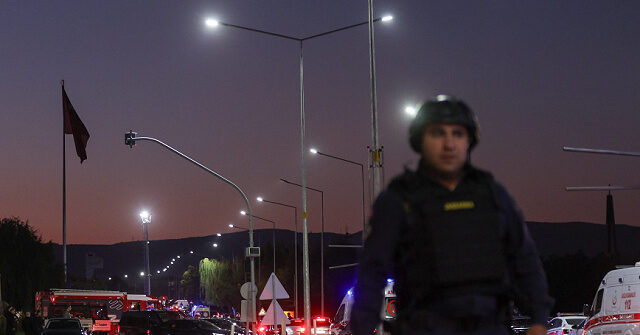On Wednesday, a terrorist attack occurred near Turkey’s capital city, Ankara, targeting Turkish Aerospace Industries (TAI), a prominent state-owned defense firm, resulting in the death of four individuals and injuring 14 others. Turkish Interior Minister Ali Yerlikaya confirmed that two attackers, identified as a man and a woman, were “neutralized,” but did not speculate on the presence of additional suspects. The attack took place in Kahramankazan, a municipality located northwest of Ankara. Eyewitness accounts described hearing both an explosion and gunfire near the facility, with local media capturing and broadcasting video of the event until a censorship order silenced the reports and imposed internet restrictions post-incident. Reports also emerged of a potential hostage situation at the TAI site, though this information remained unverified by other sources.
In the aftermath of the attack, CCTV footage surfaced showing at least three assailants, a revelation noted by Al Jazeera, which analyzed the footage revealing attackers dressed in civilian attire and brandishing weapons. Eyewitness commentary indicated that the terrorists seemed to possess prior knowledge of the site, suggesting a calculated execution of the attack rather than a spontaneous event. TAI, also recognized by its Turkish acronym TUSAS, is a critical player in Turkey’s defense sector, responsible for producing indigenous military technologies, including the TF-X Kaan, Turkey’s first modern combat aircraft. The timing of the attack raised eyebrows as it coincided with a major defense and aerospace trade fair in Istanbul, as well as Turkish President Recep Tayyip Erdogan’s critical discussions with Russian President Vladimir Putin at the BRICS summit, focusing on energy cooperation and Turkey’s aspirations to join the BRICS bloc amid stalled EU membership talks.
President Erdogan, while attending the summit in Russia, publicly condemned the attack, referring to the losses as “martyrs,” and pledging ongoing efforts to combat terrorism in Turkey. Officials, including Erdogan’s vice president and foreign minister, reiterated a commitment to bolster national defenses against all terrorist factions, hinting at a suspicion that the Kurdish separatist group PKK might be responsible for the assault. Notably, Erdogan’s remarks appeared to reflect concern over the implications of the attack on national security and political stability, suggesting a broader strategic motivation behind the violence at a critical juncture in Turkish politics.
The backdrop to these events includes potential political maneuvering, as Erdogan and his allies had previously engaged in discussions regarding a possible parole for imprisoned PKK leader Abdullah Ocalan, contingent on a cessation of terrorism. Ocalan has been confined on an island prison since 1999, and comments from Devlet Bahceli, leader of the Nationalist Movement Party (MHP), indicated a surprising shift toward negotiating with Ocalan—a move seen as an attempt by Erdogan to resonate positively with pro-Kurdish factions for ongoing constitutional reforms that would allow him to extend his presidency. This unwelcome outreach from the government may have instigated a violent response from more extreme elements within the PKK, propelling them toward a dramatic act of terror with the intent of sabotaging such negotiations.
Turkish Defense Minister Yasar Guler openly speculated during a press conference that the PKK could have orchestrated the attack, reflecting a widespread belief among government officials that the group’s operations were behind the violence. Guler condemned the PKK, underscoring the repetitive cycles of punishment the group faces and implying a failure to grasp the repercussions of their actions. The narrative surrounding this attack underscores the complexities of Turkish politics, where security concerns, national unity, and political calculation intertwine, especially in the context of rising tensions surrounding regional unrest and internal dissent against Turkish military operations.
The attack on TAI highlights not just an immediate security breach but also the precarious balance of power in Turkey’s geopolitical landscape. As Erdogan seeks to craft a nuanced relationship with both international partners and internal factions, the repercussions of such an attack could impact his political ambitions as well as broader security policies. In the wake of this incident, the Turkish government faces pressing questions about its anti-terror strategy and domestic cohesion amid escalating violence and unrest, with the PKK’s potential involvement serving as a flashpoint for renewed debates on national security and the handling of dissent within the country. The assault at TAI represents a pivotal moment, one that may influence Turkey’s defense strategies and its position on the global stage, as it grapples with threats both from within and outside its borders.

